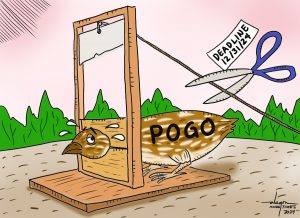 PALIMBANG, Sultan Kudarat (MindaNews) — Dozens of married Moro women in this impoverished Muslim-dominated town have stepped out of the shadows of their largely patriarchal community.
PALIMBANG, Sultan Kudarat (MindaNews) — Dozens of married Moro women in this impoverished Muslim-dominated town have stepped out of the shadows of their largely patriarchal community.
By finding work, these courageous women not only help bring food to the family table but, more importantly, contribute in fostering peace enjoyed by the townsfolk after decades of turmoil brought by the Moro rebellion and “rido” or violent clan feuds in the area.
Previously, it was unthinkable for Moro wives here to be working, having been brought up to be subordinate to their husbands, or relegated to the role “of obedient wives who must make the house in order and just tend to the needs of their children.”
But times are changing and in this second-class municipality, the women formed themselves into the Palimbang Entrepreneurs and Agrarian Reform Beneficiaries Cooperative (PEARBCO).
Based in Barangay Barongis, the cooperative, organized five years ago, is empowering the women, many of them wives of members of the Moro National Liberation Front (MNLF) and the Moro Islamic Liberation Front (MILF).
“It was a difficult struggle because we had to deal with the age-old tradition that Moro women should just tend the home. Changing mindset does not come overnight, especially since most of these women have little education,” Crystal Ali Solaiman, PEARBCO general manager, said
Even her husband objected to the idea of a working Moro wife.
With the help of government agencies such as the departments of Agrarian Reform, Trade and Industry, and Agriculture, the cooperative engaged in the production of banana chips, bagoong (fermented fish), rice coffee and vinegar, among others, providing work directly to some 70 Moro women members.
PEARBCO also helps indigenous peoples (IPs) and other marginalized folk earn income by buying and selling their colorful sleeping mats, shoulder and hand bags and baskets made of raw materials that are abundant in the locality such as nipa and nito.
From just a little over two dozen regular members when it started, the cooperative has attracted at least 200 associate members that included not just Moro women but also MILF and MNLF members and their wives, farmers, fishermen, IPs and Christian settlers.
Ghastly past
Created on August 14, 1959, this town has been a known hotbed of the Moro struggle. Palimbang was the site of one of the most horrific atrocities committed by state forces against the Moro people – the Palimbang or Malsibong Massacre of 1974., where some 1,500 male Moros were killed, some ordered to dig their own graves along the shorelines, according to published documentations and testimonies of survivors.
The victims were herded inside the mosque in Barangay Malisbong where some of them were shot to death by soldiers, a grave violation of human rights under President Ferdinand Marcos’s martial law.
Mayor Joenimi Kapina said the town’s peace and order condition now has significantly improved, attracting local investors and tourists.
“Before, when 5 p.m. strikes, you will seldom see people in the streets due to the fear sown by lawless elements. When I took over the helm two years ago, I strongly advocated the need to stabilize peace and order to attract the interests of investors and tourists,” he told MindaNews.
Just this year, MAM Agri Venture Industrial Corp, a wholly-owned Moro family corporation, started a P100 million-banana venture, the first big-ticket investment in the locality since the 1970s after the American firm Weyerhaeuser Logging Company left the town due to shrinking profits and the deteriorating peace and order problem then.
Local tourist traffic has been going up lately, mostly going to its largely unspoiled beach destinations.
Solaiman noted the cooperative’s work to empower the town’s female population was in support of the government’s peace and order initiatives in war-torn Moro communities across Mindanao.
OFW dependency
Many households in this town located three hour away by car from General Santos City, have female members working as domestic helpers mostly in the Middle East, according to Solaiman.
Because these overseas Filipino workers have been regularly sending money back home, their family members “don’t exert much efforts anymore” to find work, merely looking forward to their monthly remittances to splurge on non-essential commodities, she added.
Solaiman said the cooperative has been conducting financial literacy to the local populace, especially the “old generation” mothers or those aged 60 and older, to help them manage remittance money properly.
“They are sacrificing abroad while you’re just bingeing their hard-earned money. It’s not fair. You must spend the remittance money properly to the point of investing on home development or saving, so that when they come home, they can see the gains of their sacrifices,” Solaiman would advise the OFWs’ parents.
A lot of the mothers of the OFWs eventually joined and worked for the cooperative to earn money themselves, she added.
The cooperative favors livelihood or skills training rather than cash dole-outs from the grants donors, including the government, have been extending.
“When you teach them skills, that will not go away. When you give them money, it goes away easily,” she noted.
For her leadership and community work, Solaiman was adjudged the national winner of the 2019 Search for Outstanding Rural Women given by the Department of Agriculture.
The women’s association that she founded has come a long way, from their humble beginnings of “selling banana fries using a loaned cooking pan and banana products sealed using a candle.”
Solaiman’s family donated a lot where PEARBCO constructed a concrete building, from government grant funds. The building serves as its production facility, providing regular work for its women members. She stressed that for the Moro family’s life to be easier, both husband and wife should help each other. People should not underestimate the capability of women.
Solaiman lamented that for far too long, Filipino society has been undermining Moro cooperatives, especially those run by women. But they also have shown that Moro women are capable of becoming productive, successful and can contribute to the community in terms of fostering peace and development.(Bong S. Sarmiento / MindaNews)


